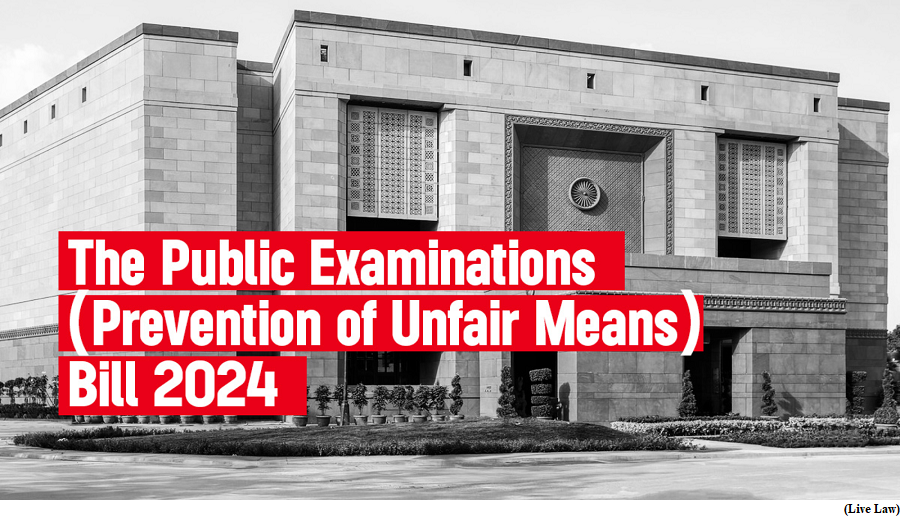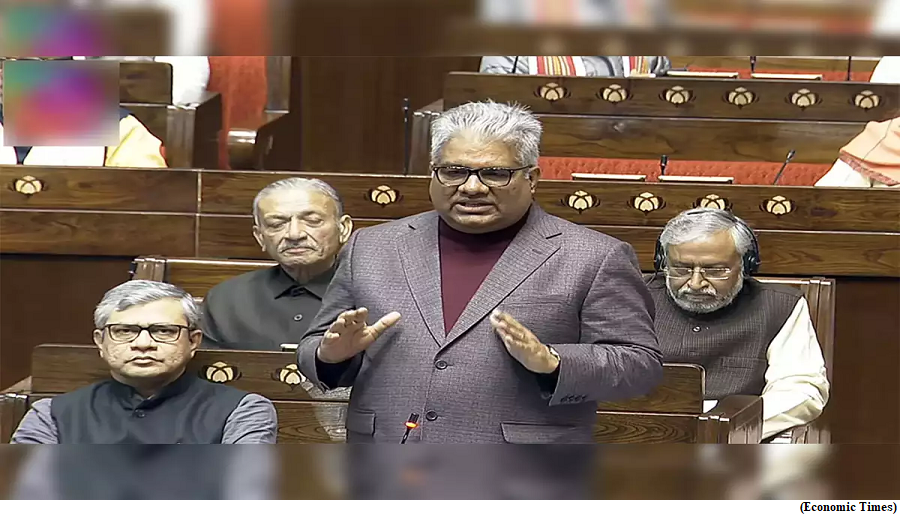Public Examinations (Prevention of Unfair Means) Bill, 2024 (GS Paper 2, Governance)

Why in news?
- The Public Examinations (Prevention of Unfair Means) Bill, 2024, was introduced in Lok Sabha on Monday (February 5), and passed on February 6. The Bill aims to prevent “unfair means” in order to “bring greater transparency, fairness and credibility to the public examinations system”.
What is meant by the use of “unfair means” in an examination?
- Section 3 of the Bill lists at least 15 actions that amount to using unfair means in public examinations “for monetary or wrongful gain”.
- These acts include:
- “leakage of question paper or answer key or part thereof” and colluding in such leakage;
- “accessing or taking possession of question paper or an Optical Mark Recognition response sheet without authority”;
- “tampering with answer sheets including Optical Mark Recognition response sheets”;
- “providing solution to one or more questions by any unauthorised person during a public examination”, and
- “directly or indirectly assisting the candidate” in a public examination.
- “tampering with any document necessary for short-listing of candidates or finalising the merit or rank of a candidate”;
- “tampering with the computer network or a computer resource or a computer system”;
- “creation of fake website” and
- “conduct of fake examination, issuance of fake admit cards or offer letters to cheat or for monetary gain” as illegal acts.
Which exams are “public examinations” as defined in the Bill?
- Under Section 2(k), a “public examination” is defined as any examination conducted by a “public examination authority” listed in the Schedule of the Bill, or any “such other authority as may be notified by the Central Government”.
The schedule lists five public examination authorities:
- the Union Public Service Commission (UPSC), which conducts the Civil Services Examination, Combined Defence Services Examinations, Combined Medical Services Examination, Engineering Services Examination, etc.;
- the Staff Selection Commission (SSC), which recruits for Group C (non-technical) and Group B (non-gazetted) jobs in the central government;
- the Railway Recruitment Boards (RRBs), which recruit Groups C and D staff in the Indian Railways;
- the Institute of Banking Personnel Selection (IBPS), which hires at all levels for nationalised banks and regional rural banks (RRBs); and
- National Testing Agency (NTA), which conducts the JEE (Main), NEET-UG, UGC-NET, the Common University Entrance Test (CUET), etc.
- Apart from these designated public examination authorities, all “Ministries or Departments of the Central Government and their attached and subordinate offices for recruitment of staff” will also come under the purview of the new law.
- The central government can add new authorities in the schedule through a notification as and when required.
What punishment does the proposed law provide for violations?
- Section 9 of the Bill states that all offences shall be cognizable, non-bailable, and non-compoundable which means that an arrest can be made without a warrant and bail will not be a matter of right; rather, a magistrate will determine whether the accused is fit to be released on bail.
- A non-compoundable offence is one in which the case cannot be withdrawn by the complainant even when the complainant and the accused have reached a compromise, and a trial must necessarily follow.
- Punishment for “any person or persons resorting to unfair means and offences” can be three to five years in prison, and a fine up to Rs 10 lakh. If the convict fails to pay the fine, “an additional punishment of imprisonment shall be imposed, as per the provisions of the Bharatiya Nyaya Sanhita, 2023,” Section 10(1) of the Bill says.
- Under Section 10(2), a service provider who is engaged to provide “support of any computer resource or any material, by whatever name it may be called” for the conduct of the examination can be fined up to Rs 1 crore, along with other penalties.
Organised crime:
- The Bill provides for harsher punishment in cases of organised paper leaks, where “organised crime” is defined as unlawful activity by a group of persons colluding in a conspiracy “to pursue or promote a shared interest for wrongful gain in respect of a public examination”.
- Section 11(1) says the punishment for organised crime will be “imprisonment for a term not less than five years but which may extend to ten years” and a fine “which shall not be less than one crore rupees”.
Why has the government brought this Bill?
- There have been a very large number of cases of question paper leaks in recruitment exams across the country in recent years.
- At least 48 instances of paper leaks in 16 states over the last five years, in which the process of hiring for government jobs was disrupted. The leaks touched the lives of at least 1.51 crore applicants for about 1.2 lakh posts.
- The objective of the Bill is to bring greater transparency, fairness and credibility to the public examination systems and to reassure the youth that their sincere and genuine efforts will be fairly rewarded and their future is safe.
- The Bill, once it becomes law, will also serve the important function of being “a model draft for States to adopt at their discretion”. This would aid States in preventing the criminal elements from disrupting conduct of their State level public examinations.
Rajya Sabha passes Water (Prevention and Control of Pollution) Amendment Bill 2024
(GS Paper 2, Governance)
Why in news?
- The Rajya Sabha recently passed the Water (Prevention and Control of Pollution) Amendment Bill 2024 which seeks to decriminalise minor offences related to water pollution.
- It will enable the Centre to prescribe service conditions of chairpersons of State Pollution Control Boards, and exempt certain categories of industrial plants from statutory restrictions.

Objective:
- According to the statement of objects and reasons of the Bill, the amendment proposes to rationalise criminal provisions and ensure that citizens, businesses and companies operate without fear of imprisonment for minor, technical or procedural defaults.
- Also, the nature of penal consequence of an offence must be commensurate with the seriousness of offence.
Details:
- It amends the Water (Prevention and Control of Pollution) Act, 1974.
- The Act establishes the central and state pollution control boards (CPCB and SPCBs) to prevent and control water pollution.
- The Bill decriminalises several violations, and instead imposes penalties.
Key Highlights:
Consent exemptions for establishing industries:
- As per the Act, prior consent of the SPCB is required for establishing any industry or treatment plant, which is likely to discharge sewage into a water body, sewer, or land.
- The Bill specifies that the central government, in consultation with the CPCB, may exempt certain categories of industrial plants from obtaining such consent.
- The Bill also adds that the central government may issue guidelines for the grant, refusal, or cancellation of consent granted by the SPCB. Under the Act, establishing and operating an industry without obtaining such consent from the SPCB is punishable with imprisonment up to six years and fine.
- It also penalises tampering with monitoring devices used in determining whether any industry or treatment plant can be set up. The penalty will be between Rs 10,000 and Rs 15 lakh.
Chairman of State Board:
- Under the Act, chairman of an SPCB is nominated by the state government.
- The Bill adds that the central government will prescribe the manner of nomination and the terms and conditions of service of the chairman.
Discharge of polluting matter:
- Under the Act, the SPCB may issue directions to immediately restrain any activity which is leading to discharge of noxious or polluting matter in water bodies.
- The Act also prohibits violation of standards (laid down by SPCB) regarding polluting matter in water bodies or on land, barring some exemptions. Exemptions include depositing non-polluting materials on the bank of a stream for reclaiming land.
- Violation of these provisions is punishable with an imprisonment term between one and a half years and six years, and a fine.
- The Bill removes the punishment and instead, imposes a penalty between Rs 10,000 and Rs 15 lakh.
Penalty for other offences:
- Under the Act, an offence for which punishment is not explicitly specified is punishable with an imprisonment term of up to three months or a fine of up to Rs 10,000, or both.
- The Bill removes imprisonment as a punishment, and prescribes a penalty between Rs 10,000 and Rs 15 lakh.
- Failure to pay penalty for violation of any provision under the Act will attract an imprisonment term of up to three years, or a fine up to twice the amount of penalty imposed.
Adjudicating officer to determine penalties:
- The Bill allows the central government to appoint adjudication officers to determine penalties under the Act. The officer must be of the level of a Joint Secretary to the central government, or of Secretary to the state government.
- Appeals against orders passed by the adjudicating officer may be made before the National Green Tribunal, after depositing 10% of the penalty levied.
- Penalties imposed by the adjudicating officer will be credited to the Environment Protection Fund established under the Environment (Protection) Act, 1986.
Cognizance of offences:
- As per the Act, a court may take cognizance of an offence if a complaint is made by the CPCB or SPCB, or a person who has given a notice of the complaint to the Boards.
- The Bill adds that cognizance may also be taken if a complaint is made by the adjudicating officer.



